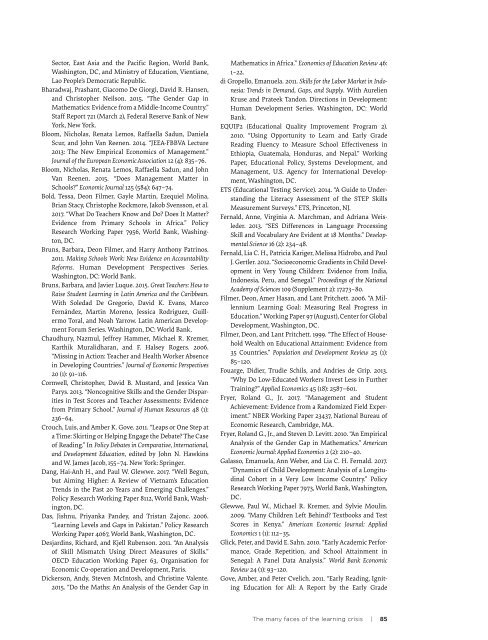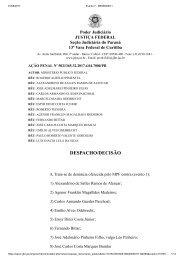Brasil só deve dominar Leitura em 260 anos, aponta estudo do Banco Mundial Relatorio Banco Mundial _Learning
Create successful ePaper yourself
Turn your PDF publications into a flip-book with our unique Google optimized e-Paper software.
Sector, East Asia and the Pacific Region, World Bank,<br />
Washington, DC, and Ministry of Education, Vientiane,<br />
Lao People’s D<strong>em</strong>ocratic Republic.<br />
Bharadwaj, Prashant, Giacomo De Giorgi, David R. Hansen,<br />
and Christopher Neilson. 2015. “The Gender Gap in<br />
Math<strong>em</strong>atics: Evidence from a Middle-Income Country.”<br />
Staff Report 721 (March 2), Federal Reserve Bank of New<br />
York, New York.<br />
Bloom, Nicholas, Renata L<strong>em</strong>os, Raffaella Sadun, Daniela<br />
Scur, and John Van Reenen. 2014. “JEEA-FBBVA Lecture<br />
2013: The New Empirical Economics of Manag<strong>em</strong>ent.”<br />
Journal of the European Economic Association 12 (4): 835–76.<br />
Bloom, Nicholas, Renata L<strong>em</strong>os, Raffaella Sadun, and John<br />
Van Reenen. 2015. “Does Manag<strong>em</strong>ent Matter in<br />
Schools?” Economic Journal 125 (584): 647–74.<br />
Bold, Tessa, Deon Filmer, Gayle Martin, Ezequiel Molina,<br />
Brian Stacy, Christophe Rockmore, Jakob Svensson, et al.<br />
2017. “What Do Teachers Know and Do? Does It Matter?<br />
Evidence from Primary Schools in Africa.” Policy<br />
Research Working Paper 7956, World Bank, Washington,<br />
DC.<br />
Bruns, Barbara, Deon Filmer, and Harry Anthony Patrinos.<br />
2011. Making Schools Work: New Evidence on Accountability<br />
Reforms. Human Development Perspectives Series.<br />
Washington, DC: World Bank.<br />
Bruns, Barbara, and Javier Luque. 2015. Great Teachers: How to<br />
Raise Student <strong>Learning</strong> in Latin America and the Caribbean.<br />
With Soledad De Gregorio, David K. Evans, Marco<br />
Fernández, Martin Moreno, Jessica Rodriguez, Guillermo<br />
Toral, and Noah Yarrow. Latin American Development<br />
Forum Series. Washington, DC: World Bank.<br />
Chaudhury, Nazmul, Jeffrey Hammer, Michael R. Kr<strong>em</strong>er,<br />
Karthik Muralidharan, and F. Halsey Rogers. 2006.<br />
“Missing in Action: Teacher and Health Worker Absence<br />
in Developing Countries.” Journal of Economic Perspectives<br />
20 (1): 91–116.<br />
Cornwell, Christopher, David B. Mustard, and Jessica Van<br />
Parys. 2013. “Noncognitive Skills and the Gender Disparities<br />
in Test Scores and Teacher Assessments: Evidence<br />
from Primary School.” Journal of Human Resources 48 (1):<br />
236–64.<br />
Crouch, Luis, and Amber K. Gove. 2011. “Leaps or One Step at<br />
a Time: Skirting or Helping Engage the Debate? The Case<br />
of Reading.” In Policy Debates in Comparative, International,<br />
and Development Education, edited by John N. Hawkins<br />
and W. James Jacob, 155–74. New York: Springer.<br />
Dang, Hai-Anh H., and Paul W. Glewwe. 2017. “Well Begun,<br />
but Aiming Higher: A Review of Vietnam’s Education<br />
Trends in the Past 20 Years and Emerging Challenges.”<br />
Policy Research Working Paper 8112, World Bank, Washington,<br />
DC.<br />
Das, Jishnu, Priyanka Pandey, and Tristan Zajonc. 2006.<br />
“<strong>Learning</strong> Levels and Gaps in Pakistan.” Policy Research<br />
Working Paper 4067, World Bank, Washington, DC.<br />
Desjardins, Richard, and Kjell Rubenson. 2011. “An Analysis<br />
of Skill Mismatch Using Direct Measures of Skills.”<br />
OECD Education Working Paper 63, Organisation for<br />
Economic Co-operation and Development, Paris.<br />
Dickerson, Andy, Steven McIntosh, and Christine Valente.<br />
2015. “Do the Maths: An Analysis of the Gender Gap in<br />
Math<strong>em</strong>atics in Africa.” Economics of Education Review 46:<br />
1–22.<br />
di Gropello, Emanuela. 2011. Skills for the Labor Market in In<strong>do</strong>nesia:<br />
Trends in D<strong>em</strong>and, Gaps, and Supply. With Aurelien<br />
Kruse and Prateek Tan<strong>do</strong>n. Directions in Development:<br />
Human Development Series. Washington, DC: World<br />
Bank.<br />
EQUIP2 (Educational Quality Improv<strong>em</strong>ent Program 2).<br />
2010. “Using Opportunity to Learn and Early Grade<br />
Reading Fluency to Measure School Effectiveness in<br />
Ethiopia, Guat<strong>em</strong>ala, Honduras, and Nepal.” Working<br />
Paper, Educational Policy, Syst<strong>em</strong>s Development, and<br />
Manag<strong>em</strong>ent, U.S. Agency for International Development,<br />
Washington, DC.<br />
ETS (Educational Testing Service). 2014. “A Guide to Understanding<br />
the Literacy Assessment of the STEP Skills<br />
Measur<strong>em</strong>ent Surveys.” ETS, Princeton, NJ.<br />
Fernald, Anne, Virginia A. Marchman, and Adriana Weisleder.<br />
2013. “SES Differences in Language Processing<br />
Skill and Vocabulary Are Evident at 18 Months.” Developmental<br />
Science 16 (2): 234–48.<br />
Fernald, Lia C. H., Patricia Kariger, Melissa Hidrobo, and Paul<br />
J. Gertler. 2012. “Socioeconomic Gradients in Child Development<br />
in Very Young Children: Evidence from India,<br />
In<strong>do</strong>nesia, Peru, and Senegal.” Proceedings of the National<br />
Acad<strong>em</strong>y of Sciences 109 (Suppl<strong>em</strong>ent 2): 17273–80.<br />
Filmer, Deon, Amer Hasan, and Lant Pritchett. 2006. “A Millennium<br />
<strong>Learning</strong> Goal: Measuring Real Progress in<br />
Education.” Working Paper 97 (August), Center for Global<br />
Development, Washington, DC.<br />
Filmer, Deon, and Lant Pritchett. 1999. “The Effect of Household<br />
Wealth on Educational Attainment: Evidence from<br />
35 Countries.” Population and Development Review 25 (1):<br />
85–120.<br />
Fouarge, Didier, Trudie Schils, and Andries de Grip. 2013.<br />
“Why Do Low-Educated Workers Invest Less in Further<br />
Training?” Applied Economics 45 (18): 2587–601.<br />
Fryer, Roland G., Jr. 2017. “Manag<strong>em</strong>ent and Student<br />
Achiev<strong>em</strong>ent: Evidence from a Ran<strong>do</strong>mized Field Experiment.”<br />
NBER Working Paper 23437, National Bureau of<br />
Economic Research, Cambridge, MA.<br />
Fryer, Roland G., Jr., and Steven D. Levitt. 2010. “An Empirical<br />
Analysis of the Gender Gap in Math<strong>em</strong>atics.” American<br />
Economic Journal: Applied Economics 2 (2): 210–40.<br />
Galasso, Emanuela, Ann Weber, and Lia C. H. Fernald. 2017.<br />
“Dynamics of Child Development: Analysis of a Longitudinal<br />
Cohort in a Very Low Income Country.” Policy<br />
Research Working Paper 7973, World Bank, Washington,<br />
DC.<br />
Glewwe, Paul W., Michael R. Kr<strong>em</strong>er, and Sylvie Moulin.<br />
2009. “Many Children Left Behind? Textbooks and Test<br />
Scores in Kenya.” American Economic Journal: Applied<br />
Economics 1 (1): 112–35.<br />
Glick, Peter, and David E. Sahn. 2010. “Early Acad<strong>em</strong>ic Performance,<br />
Grade Repetition, and School Attainment in<br />
Senegal: A Panel Data Analysis.” World Bank Economic<br />
Review 24 (1): 93–120.<br />
Gove, Amber, and Peter Cvelich. 2011. “Early Reading, Igniting<br />
Education for All: A Report by the Early Grade<br />
The many faces of the learning crisis | 85








